<< Back
At Natchaug, Clients Know They Can Relate to First Recovery Support Specialist

November 15, 2018
Tonya Cutler stands in front of the room, tapping a marker on the list of “triggers” written on a large sheet of paper taped to the wall.
While one of the eight adolescents in the room paces relentlessly around the perimeter, his ears picking up everything she says, two girls seem to ignore her, passing cards back and forth. A second boy lounges prone on a stack of gym mats; a third interrupts constantly with questions.
“If I’m being bullied,” Cutler persists despite the distractions, “what am I thinking at that point? What do I do?”
Slowly, the teens offer answers.
“I ignore them.”
“I overexplain myself.”
“I get angry because I can’t do anything about it.”
The simple exercise on triggers and consequences of drug and alcohol use with teens in the Natchaug Hospital residential program is one way Cutler, the facility’s first recovery support specialist (RSS), helps clients.
The 45-year-old Colchester resident started part-time inpatient at the Institute of Living about two years ago, moving to the outpatient setting at Rushford before Natchaug created her inpatient position. While Hartford HealthCare introduced recovery coaches in emergency rooms to help people overdosing, the RSS supports people struggling with recovery and mental health issues, as someone who understands from experience.
“The RSS is in recovery, too,” says Cutler, who was diagnosed with anxiety, depression, post-traumatic stress disorder and bipolar disorder, and used pain medication and cocaine to cope with her diagnoses and chronic physical and emotional pain before going to Rushford’s Medication Assisted Treatment Close to Home in Glastonbury.
Cutler embraced treatment and “worked hard at seeing where it stems from” emotionally. She was speaking at Rushford programs and serving on its Client and Family Advisory Council when a staff member suggested she become RSS-certified.
“The clients need people who can relate to and understand what they’re going through,” she says of the 80-hour state certification through Recovery University, which led her back to Rushford first as a volunteer and then an employee. “It’s the best of both worlds – they get medical experience from the doctors and ‘lived’ experience from me.
“The clients have been very responsive to me. They know they can trust me because we can relate to each other. They know I’m not judging them.”
This was the most important factor in instituting the RSS position, according to Behavioral Health Network President Patricia Rehmer.
“It’s critical that the clients feel safe and understood,” she says. “No one but a person who has been in their shoes can truly understand the grips of substance use and mental illness. Tonya brings her own experience and an incredible amount of compassion to the job. She impacts the lives of our clients every single day.”
Cutler is constant motion. On a typical day, she schedules one-on-one sessions with clients, then makes Caring Connection calls as part of the Zero Suicide Initiative to newly released patients, checking on their transition home. She also runs adolescent and adult recovery groups at Natchaug, drawing on various tools for sessions like “Tips for Recovery” and “Smart Recovery.”
The mother of three and grandmother of one finds her new vocation a way to channel the trouble she’s faced.
“It’s how I can make things that were so bad in my life count for something,” she says. “It eases the shame and guilt for me.”
She also understands how alienating recovery can feel.
“My family initially felt it was my problem,” she says. “Part of my recovery was talking to them; we had many hard conversations. My kids were angry and scared. They grew up with that being normal. I didn’t see the effect of it on them. My journey in recovery began with a late-night conversation with my son. That heart-to-heart with him saved my life and changed the lives of my family.”
Slight with bright eyes, a pony tail and a whimsical mustache tattooed on her right index finger – “See?” she says, putting her finger under her nose. “It’s fun!” – Cutler says she gets as much out of her work as clients at Natchaug.
“We learn from each other – about having patience, respecting other people’s perspective, appreciating others uniqueness,” she says. “It’s an extension of my recovery and it plays a role in my healing as I learn to connect on a deeper level.”
For more information on services at Natchaug Hospital, click here.